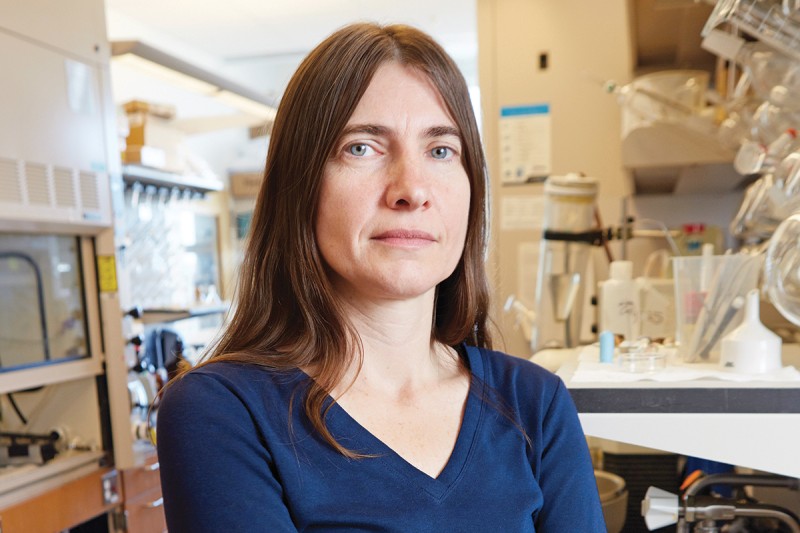
Drug discovery is “a long, complex effort,” says chemical biologist Gabriela Chiosis, a member of the Sloan Kettering Institute’s Molecular Pharmacology and Chemistry Program. She should know. The journey to the discovery in her laboratory of how a small molecule can be used to block the activity of a cancer-promoting protein began more than a decade ago.
Dr. Chiosis’ laboratory brings together experts in biology, chemistry, and medicine to investigate proteins called chaperones, which help maintain a cell’s function by assisting other proteins to fold properly. In some diseases, however, the protective function of chaperones has the paradoxical effect of stabilizing a variety of proteins required for tumor growth and progression.
One such chaperone protein is called heat shock protein 90 (Hsp90). As its name suggests, heat shock proteins protect cells when they are stressed by high temperatures, but Hsp90 is also known to play a role in cancer, as well as in some neurodegenerative diseases.
“A Very Promising Target”
“Hsp90 is a very promising target for cancer therapy,” Dr. Chiosis says. In 2005, she and her colleagues discovered a small molecule called PU-H71 that blocks the activity of Hsp90. “It was recognized at the time as an important finding,” she recalls. Next, she and her collaborators began exploring the biology of PU-H71 and how best to develop the compound into an agent that could be used clinically.
What they knew was that certain cancers are “addicted” to the activity of Hsp90, and that it would be these tumors that would be most sensitive to therapy with PU-H71. The investigators needed a way to select patients who had cancers with increased reliance on Hsp90.
It became clear that attaching a radioactive label to PU-H71 could allow them to identify Hsp90-avid tumors. Working with MSK’s Departments of Radiochemistry and Radiology, Dr. Chiosis’ laboratory developed a radioactively labeled version of PU-H71.
“Now we can see the real-time distribution of PU-H71 everywhere in the body,” she says. “When you give a patient a drug, you don’t really know where it goes. But with radiolabeled PU-H71, a patient is like an open book.”
Visualizing Activity in the Body
In early investigational clinical studies now ongoing at MSK, patients are given PU-H71 labeled with a very small amount of radioactive iodine, enabling doctors to perform PET scans to visualize how the drug is taken up in cancer cells.
“Tumors with active Hsp90 light up — and the more sensitive a tumor, the more it lights up,” explains Dr. Chiosis. “We can see not only where the agent is but also how long it stays there. And we can also see how much of the agent is actually in a tumor itself, so we know the concentration of the drug at any given time. This is a feat I don’t think has yet been achieved in any targeted therapy in oncology.”
Having not only the therapeutic agent but also the companion diagnostic provides investigators and clinicians with a rational way to deliver PU-H71. “We’re not just giving a drug and crossing our fingers hoping that something will happen,” she says. “We have a way of monitoring what we are doing in every tumor. It is patient specific.”
In their early studies, Dr. Chiosis and her colleagues are focusing on the use of PU-H71 in several cancers, determined by the presence of Hsp90 activity.


